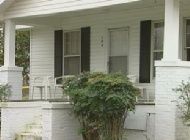Two weeks after police said a 21-year-old woman was found shot to death inside an illegal liquor house where neighbors reported wild, all-night parties, officers say they have stepped up efforts to shut them down.
Investigators, prompted by three deaths in the past 13 months linked to the after-hours parties, are teaching patrol officers and community members to recognize liquor houses. They're making cases against proprietors and encouraging landlords to help get rid of renters up to no good.
 It's hard to pinpoint the exact number of liquor houses in Charlotte, said Charlotte-Mecklenburg police vice Officer T. Mack, but police are sure of one thing: Many serve more than liquor. "You're subject to find just about anything in a liquor house -- from the alcohol to the drugs to the guns to the sex," said Mack. "Some of these places are becoming a one-stop shop for everything."
It's hard to pinpoint the exact number of liquor houses in Charlotte, said Charlotte-Mecklenburg police vice Officer T. Mack, but police are sure of one thing: Many serve more than liquor. "You're subject to find just about anything in a liquor house -- from the alcohol to the drugs to the guns to the sex," said Mack. "Some of these places are becoming a one-stop shop for everything."Often, houses have bouncers at the door, searching people for weapons and looking out for police, occasionally going inside to break up fights. Inside, officers have found elaborate setups -- furnitureless rooms that look like clubs, expensive liquor, pool tables and big-screen TVs.
Many liquor houses charge at the door. Proprietors also charge by the drink, sometimes $3 to $4 a shot, and may have a hand in drug sales, gambling and prostitution, police said.
It's not always easy to screen a liquor-house renter -- proprietors sometimes pay someone else to put a name on the lease. Neighbors are often surprised to see their once-quiet neighborhoods transformed.
"I knew something wasn't right," said Perry Lindsay, 47, who lives around the corner from what police say was a liquor house on Fleming Street.
Fatal consequences:
• Tywa She'Conda Jones, 21, was found dead inside an after-hours spot near Sugar Creek Road and The Plaza at about 5:30 a.m. April 15.The liquor house she was in had been throwing wild, all-night parties on weekends for almost a month, neighbors said. Police records show officers came to the house on April 8 after calls about a shooting, but found only bullet casings. On the night Jones died, police responded to several noise complaints from neighbors.
Homicide detectives are still seeking the assailant.
• Jamon Baker was found at the illegal liquor house on Fleming Street at about 6:30 a.m. on July 27, 2005. Baker, 28, died at Carolinas Medical Center. Two others were also shot, but survived.
Arbrey Moore, 22, has been charged with the murder, two counts of assault with a deadly weapon and possession of a firearm by a convicted felon.
 • Police say Anthony Dezon Williams Jr. spent his last night at a liquor house. Homicide Capt. Sean Mulhall said Williams was shot at or near an after-hours spot on North Ramsey Street on March 14, 2005. A woman driving him to the hospital in a 1984 Chevrolet lost control of the car on the Brookshire Freeway just before 4 a.m. The car hit a tree, sending both passengers to the hospital, where Williams was pronounced dead. Police are still looking for the shooter.
• Police say Anthony Dezon Williams Jr. spent his last night at a liquor house. Homicide Capt. Sean Mulhall said Williams was shot at or near an after-hours spot on North Ramsey Street on March 14, 2005. A woman driving him to the hospital in a 1984 Chevrolet lost control of the car on the Brookshire Freeway just before 4 a.m. The car hit a tree, sending both passengers to the hospital, where Williams was pronounced dead. Police are still looking for the shooter.Enforcement:
Mack said officers are trying to identify and close liquor houses, but admits it's harder than complaining neighbors may think. "They get shut down and another one will pop back up," he said.
Officers said uncooperative landlords or complacent neighbors often make it hard. Sometimes, it's hard to tell the difference between a liquor house and a regular party. Vice officers said they have not made alcohol-related arrests at the three houses where homicides happened because investigations focus on solving the slayings.
The best resource, officers said, is often neighbors. "The squeaky wheel gets the grease," said vice officer Shannon Updegraff. "If it's a continual thing- every Friday and Saturday for two and three weeks -- call police."
Suspect Illegal Activity? Police recommend you call the vice and narcotics tip line at: (704) 336-8423.
Police say they find out about liquor houses in two ways -- when neighbors complain and when people are hurt seriously.
